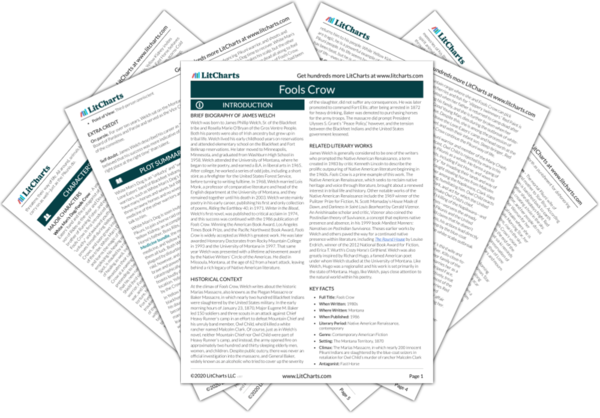White-scabs disease Quotes in Fools Crow
[White Man’s Dog] pulled back the entrance skin and saw several dark shapes around the perimeter of the lodge. As his eyes adjusted, he saw that the shapes weren’t breathing. Then, opposite him, of the shapes lifted its sleeping robe and he saw that it was a young white-faced girl. She beckoned to him, and in fright he turned to leave. But as he turned away he looked back and saw that the girl’s eyes desired him. Then all the dark shapes began to move and he saw that they were all young girls, naked and with the same look in their eyes. The white-faced girl stood and held out her arms and White Man’s Dog moved toward her. It was at this point that he would wake up.
“I have had a bad dream and it troubles me. I came and went so fast, I could make little of it. In my dream I saw a small white horse wandering in the snow. Its hooves were split and it had sores all over. It was wearing a bridle and the reins trailed after it. But it was the eyes. I looked into the eyes and they were white and unseeing. As I drew closer I saw across its back fingers of blood.”
“[…] It was there, that day while looking at my scars and my hands, that I knew why I had been punished so severely. As you men of the warrior societies know, in all things, to the extent of my ability, I have tried to act honorably. But there in that Crow lodge, in that lodge of death, I had broken one of the simplest decencies by which people live. In fornicating with the dying girl, I had taken her honor, her opportunity to die virtuously. I have taken the path traveled only by the meanest scavengers. And so Old Man, as he created me, took away my life many times and left me like this, worse than dead, to think of my transgression every day, to be reminded every time I attempt the smallest act that men take for granted.”
“I do not fear for my people now. As you say, we will go to a happier place, far from the Napikwans, this disease and starvation. But I grieve for our children and their children, who will not know the life their people once lived. I see them on the yellow skin and they are dressed like Napikwans, they watch the Napikwans and learn much from them, but they are not happy. They lose their own way.”
“Much will be lost to them,” said Feather Woman. “But they will know the way it was. The stories will be handed down, and they will see that their people were proud and lived in accordance with the Below Ones, the Underwater People—and the Above Ones.”












